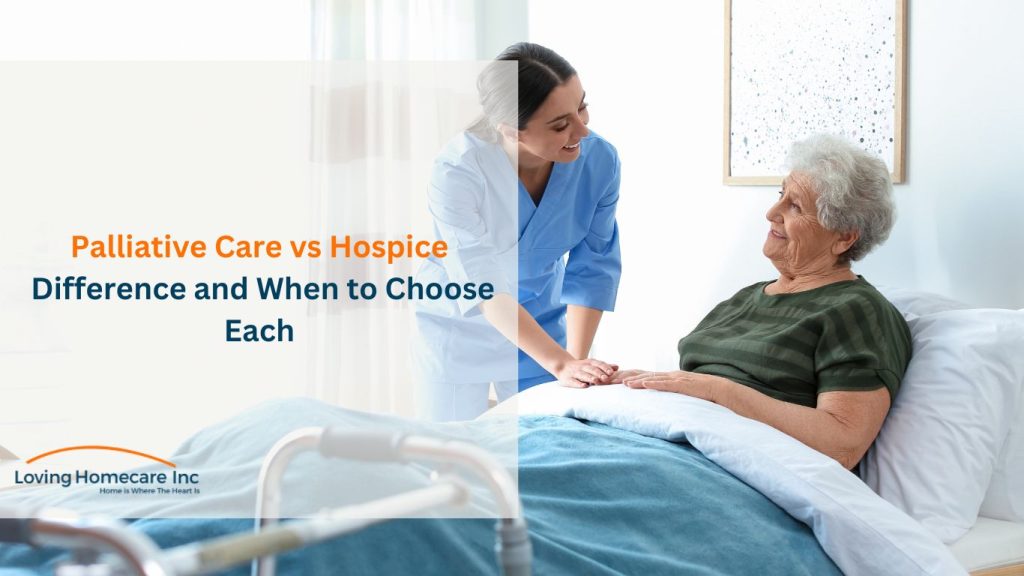Recently updated on May 14th, 2025 at 01:31 pm
Two terms frequently arise when navigating end-of-life care options: palliative care and hospice care. While they share similarities, they serve distinct purposes and cater to different needs. Understanding the differences between palliative and hospice care is crucial for making informed decisions regarding healthcare options, especially for seniors. This comprehensive guide explores the nuances of both types of care, their benefits, and when each might be the most appropriate choice.
What is Palliative Care?
 Palliative care is a holistic approach to healthcare that focuses on improving the quality of life for individuals facing serious illnesses, regardless of their prognosis. It aims to address physical, emotional, social, and spiritual needs. Unlike hospice care, palliative care and curative treatments can be provided at any stage of illness.
Palliative care is a holistic approach to healthcare that focuses on improving the quality of life for individuals facing serious illnesses, regardless of their prognosis. It aims to address physical, emotional, social, and spiritual needs. Unlike hospice care, palliative care and curative treatments can be provided at any stage of illness.
Types of Palliative Care:
Types of Palliative care is here below;
1. Primary Palliative Care: Offered by healthcare providers in various settings, including hospitals, clinics, and home care agencies.
2. Specialist Palliative Care: Provided by interdisciplinary teams, including physicians, nurses, social workers, and chaplains, specializing in managing complex symptoms and addressing emotional and spiritual concerns.
Benefits of Palliative Care:
- Symptom Management: Palliative care focuses on alleviating pain, managing symptoms, and enhancing comfort, leading to improved overall well-being.
- Enhanced Communication: It facilitates open and honest discussions between patients, families, and healthcare providers about treatment goals, preferences, and end-of-life wishes.
- Coordination of Care: Palliative care teams collaborate with other healthcare professionals to ensure seamless transitions between different levels of care and support services.
- Emotional and Spiritual Support: Patients and families receive counselling, emotional support, and assistance in coping with the challenges associated with serious illness.
When to Choose Palliative Care:
- Palliative care for seniors and for individuals of any age is appropriate and at any stage of a serious illness, whether they are receiving curative treatments or transitioning to end-of-life care.
- It is particularly beneficial for seniors facing complex health issues, as it addresses multiple aspects of well-being, including physical, emotional, and social needs.
What is Hospice Care?
What is Hospice care is a frequently asked question, Hospice care is a specialized form of healthcare designed for individuals with a terminal illness whose life expectancy is six months or less, as certified by a physician. Unlike palliative care, hospice care focuses primarily on providing comfort and support rather than pursuing curative treatments.
Types of Hospice Care:
- In-Home Hospice Care: Provided in the comfort of the patient’s home, allowing them to remain in familiar surroundings surrounded by loved ones.
- Inpatient Hospice Care is offered in a specialized hospice facility or hospital setting for individuals requiring more intensive symptom management or caregiver respite.
- Respite Care: Temporary short-term care provided in a hospice facility to give family caregivers a break from their caregiving responsibilities.
Benefits of Hospice Care:
The benefits of Hospice care are here below;
- Comfort and Dignity: Hospice care focuses on enhancing the quality of life by managing symptoms, promoting comfort, and preserving dignity during the end-of-life journey.
- Emotional Support: Hospice teams provide emotional and spiritual support to patients and their families, helping them navigate the complexities of grief and loss.
- 24/7 Access to Care: Hospice services are available around the clock, ensuring patients receive prompt attention and symptom management whenever needed.
- Family Involvement: Hospice encourages family involvement in caregiving decisions, ensuring patients’ preferences and wishes are respected and honored.
When to Choose Hospice Care:
- Hospice care is appropriate for individuals with a terminal illness whose life expectancy is six months or less, as determined by a physician.
- When curative treatments are no longer effective or desired, the focus shifts to maximizing comfort and quality of life during the end-of-life phase.
- Hospice care is particularly beneficial for seniors in the advanced stages of illness who wish to spend their remaining time in a supportive and comforting environment, surrounded by loved ones.
Palliative Care vs. Hospice Care: Key Differences
Another frequently asked question is what is the difference between palliative care and hospice. While both palliative care and hospice care share the common goal of improving the quality of life for patients with serious illnesses, several key differences set them apart:
- Timing of Initiation: Palliative care can be initiated at any stage of a serious illness, alongside curative treatments, whereas hospice care is typically introduced when curative treatments are no longer effective and life expectancy is limited to six months or less.
- Treatment Goals: Palliative care focuses on relieving symptoms, improving quality of life, and supporting patients and families throughout the illness, whereas hospice care prioritizes comfort and dignity during the end-of-life phase, preceding aggressive treatments aimed at prolonging life.
- Setting of Care: Palliative care can be provided in various settings, including hospitals, clinics, and home care settings, whereas hospice care is often delivered in the patient’s home, a hospice facility, or an inpatient hospice unit.
- Provision of Curative Treatments: Palliative care may involve curative treatments alongside symptom management, whereas hospice care does not pursue curative treatments and focuses solely on comfort and quality of life.
Conclusion:
In summary, palliative and hospice care are invaluable resources for individuals facing serious illnesses, offering comprehensive support and enhancing quality of life. While palliative care is appropriate at any stage of a serious disease and can be provided alongside curative treatments, hospice care is tailored for individuals with a terminal prognosis, focusing on comfort and dignity during the end-of-life phase. Understanding the differences between these two forms of care empowers patients and families to make informed decisions that align with their values, preferences, and goals for care, particularly for seniors needing specialized support and compassion during challenging times. Consider choosing Loving Home Care for compassionate assistance.



